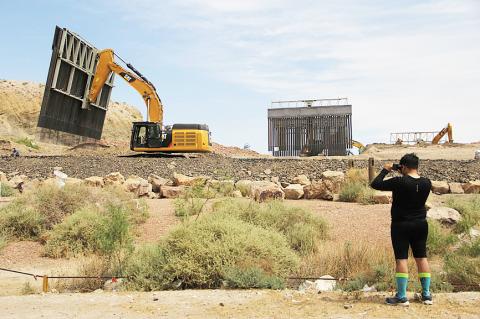The US Supreme Court on Friday cleared the way for the administration of US President Donald Trump to tap billions of dollars in Pentagon funds to build sections of a border wall with Mexico.
The court’s five conservative justices gave the administration the green light to begin work on four contracts it has awarded using US Department of Defense money.
Funding for the projects had been frozen by lower courts while a lawsuit over the money proceeded.

Photo: AFP
“Wow! Big VICTORY on the Wall. The United States Supreme Court overturns lower court injunction, allows Southern Border Wall to proceed. Big WIN for Border Security and the Rule of Law!” Trump tweeted after the ruling.
The action reverses the decision of a trial court, which in May froze the funds, and an appeals court, which earlier this month kept the freeze in place.
The freeze had prevented the government from tapping about US$2.5 billion in defense department money to replace existing sections of barriers in Arizona, California and New Mexico with more robust fencing.
The case on which the Supreme Court ruled began after the 35-day partial government shutdown that started in December last year.
Trump ended the shutdown in February after the US Congress gave him about US$1.4 billion in border wall funding, but the amount was far less than the US$5.7 billion he was seeking, and Trump then declared a national emergency to take cash from other government accounts.
The money Trump identified includes US$3.6 billion from military construction funds, US$2.5 billion in defense department money and US$600 million from the US Department of the Treasury’s asset forfeiture fund.
The case before the Supreme Court involved just the US$2.5 billion in defense department funds, which the administration says would be used to construct more than 160km of fencing.
The other funds were not at issue in the case.
The Treasury funds have so far survived legal challenges, and US Customs and Border Protection has earmarked the money for work in Texas’ Rio Grande Valley, but has not yet awarded contracts.
Transfer of the US$3.6 billion in military construction funds is awaiting approval from the defense secretary.
The lawsuit at the Supreme Court was brought by the American Civil Liberties Union (ACLU) on behalf of the Sierra Club and Southern Border Communities Coalition.
The justices who lifted the freeze on the money did not give a lengthy explanation for their decision, but said among the reasons they were doing so was that the government had made a “sufficient showing at this stage” that those bringing the lawsuit do not have a right to challenge the decision to use the money.
ACLU lawyer Dror Ladin said after the court’s announcement that the fight “is not over.”
The case would continue, but the decision suggests an ultimate victory for the ACLU is unlikely. Even if the ACLU were to win, fencing would have already been built.
The administration had argued that if it was not able to finalize the contracts by Sept. 30, then it would lose the ability to use the funds and asked for a decision quickly.

Yemen’s separatist leader has vowed to keep working for an independent state in the country’s south, in his first social media post since he disappeared earlier this month after his group briefly seized swathes of territory. Aidarous al-Zubaidi’s United Arab Emirates (UAE)-backed Southern Transitional Council (STC) forces last month captured two Yemeni provinces in an offensive that was rolled back by Saudi strikes and Riyadh’s allied forces on the ground. Al-Zubaidi then disappeared after he failed to board a flight to Riyadh for talks earlier this month, with Saudi Arabia accusing him of fleeing to Abu Dhabi, while supporters insisted he was

The Chinese Embassy in Manila yesterday said it has filed a diplomatic protest against a Philippine Coast Guard spokesman over a social media post that included cartoonish images of Chinese President Xi Jinping (習近平). Philippine Coast Guard spokesman Jay Tarriela and an embassy official had been trading barbs since last week over issues concerning the disputed South China Sea. The crucial waterway, which Beijing claims historic rights to despite an international ruling that its assertion has no legal basis, has been the site of repeated clashes between Chinese and Philippine vessels. Tarriela’s Facebook post on Wednesday included a photo of him giving a

Syrian President Ahmed al-Sharaa on Sunday announced a deal with the chief of Kurdish-led forces that includes a ceasefire, after government troops advanced across Kurdish-held areas of the country’s north and east. Syrian Kurdish leader Mazloum Abdi said he had agreed to the deal to avoid a broader war. He made the decision after deadly clashes in the Syrian city of Raqa on Sunday between Kurdish-led forces and local fighters loyal to Damascus, and fighting this month between the Kurds and government forces. The agreement would also see the Kurdish administration and forces integrate into the state after months of stalled negotiations on

‘MOBILIZED’: While protesters countered ICE agents, Minnesota Governor Tim Walz activated the state’s National Guard to ‘support the rights of Minnesotans’ to assemble Hundreds of counterprotesters drowned out a far-right activist’s attempt to hold a small rally in support of US President Donald Trump’s latest immigration crackdown in Minneapolis, Minnesota, on Saturday, as the governor’s office announced that National Guard troops were mobilized and ready to assist law enforcement, although not yet deployed to city streets. There have been protests every day since the US Department of Homeland Security (DHS) ramped up immigration enforcement in the Twin Cities of Minneapolis and Saint Paul by bringing in more than 2,000 federal officers. Conservative influencer Jake Lang organized an anti-Islam, anti-Somali and pro-US Immigration and Customs Enforcement